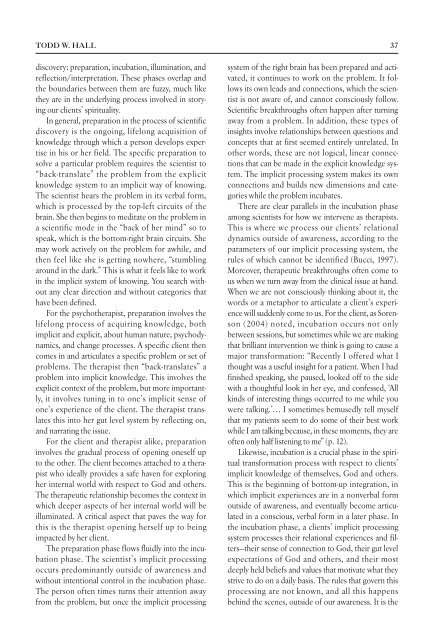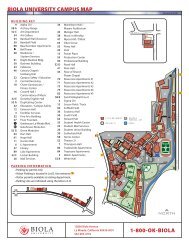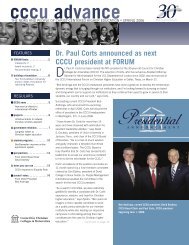Psychoanalysis, Attachment, and Spirituality Part II ... - Dr. Todd Hall
Psychoanalysis, Attachment, and Spirituality Part II ... - Dr. Todd Hall
Psychoanalysis, Attachment, and Spirituality Part II ... - Dr. Todd Hall
You also want an ePaper? Increase the reach of your titles
YUMPU automatically turns print PDFs into web optimized ePapers that Google loves.
TODD W. HALL 37<br />
discovery: preparation, incubation, illumination, <strong>and</strong><br />
reflection/interpretation. These phases overlap <strong>and</strong><br />
the boundaries between them are fuzzy, much like<br />
they are in the underlying process involved in storying<br />
our clients’ spirituality.<br />
In general, preparation in the process of scientific<br />
discovery is the ongoing, lifelong acquisition of<br />
knowledge through which a person develops expertise<br />
in his or her field. The specific preparation to<br />
solve a particular problem requires the scientist to<br />
“back-translate” the problem from the explicit<br />
knowledge system to an implicit way of knowing.<br />
The scientist hears the problem in its verbal form,<br />
which is processed by the top-left circuits of the<br />
brain. She then begins to meditate on the problem in<br />
a scientific mode in the “back of her mind” so to<br />
speak, which is the bottom-right brain circuits. She<br />
may work actively on the problem for awhile, <strong>and</strong><br />
then feel like she is getting nowhere, “stumbling<br />
around in the dark.” This is what it feels like to work<br />
in the implicit system of knowing. You search without<br />
any clear direction <strong>and</strong> without categories that<br />
have been defined.<br />
For the psychotherapist, preparation involves the<br />
lifelong process of acquiring knowledge, both<br />
implicit <strong>and</strong> explicit, about human nature, psychodynamics,<br />
<strong>and</strong> change processes. A specific client then<br />
comes in <strong>and</strong> articulates a specific problem or set of<br />
problems. The therapist then “back-translates” a<br />
problem into implicit knowledge. This involves the<br />
explicit context of the problem, but more importantly,<br />
it involves tuning in to one’s implicit sense of<br />
one’s experience of the client. The therapist translates<br />
this into her gut level system by reflecting on,<br />
<strong>and</strong> narrating the issue.<br />
For the client <strong>and</strong> therapist alike, preparation<br />
involves the gradual process of opening oneself up<br />
to the other. The client becomes attached to a therapist<br />
who ideally provides a safe haven for exploring<br />
her internal world with respect to God <strong>and</strong> others.<br />
The therapeutic relationship becomes the context in<br />
which deeper aspects of her internal world will be<br />
illuminated. A critical aspect that paves the way for<br />
this is the therapist opening herself up to being<br />
impacted by her client.<br />
The preparation phase flows fluidly into the incubation<br />
phase. The scientist’s implicit processing<br />
occurs predominantly outside of awareness <strong>and</strong><br />
without intentional control in the incubation phase.<br />
The person often times turns their attention away<br />
from the problem, but once the implicit processing<br />
system of the right brain has been prepared <strong>and</strong> activated,<br />
it continues to work on the problem. It follows<br />
its own leads <strong>and</strong> connections, which the scientist<br />
is not aware of, <strong>and</strong> cannot consciously follow.<br />
Scientific breakthroughs often happen after turning<br />
away from a problem. In addition, these types of<br />
insights involve relationships between questions <strong>and</strong><br />
concepts that at first seemed entirely unrelated. In<br />
other words, these are not logical, linear connections<br />
that can be made in the explicit knowledge system.<br />
The implicit processing system makes its own<br />
connections <strong>and</strong> builds new dimensions <strong>and</strong> categories<br />
while the problem incubates.<br />
There are clear parallels in the incubation phase<br />
among scientists for how we intervene as therapists.<br />
This is where we process our clients’ relational<br />
dynamics outside of awareness, according to the<br />
parameters of our implicit processing system, the<br />
rules of which cannot be identified (Bucci, 1997).<br />
Moreover, therapeutic breakthroughs often come to<br />
us when we turn away from the clinical issue at h<strong>and</strong>.<br />
When we are not consciously thinking about it, the<br />
words or a metaphor to articulate a client’s experience<br />
will suddenly come to us. For the client, as Sorenson<br />
(2004) noted, incubation occurs not only<br />
between sessions, but sometimes while we are making<br />
that brilliant intervention we think is going to cause a<br />
major transformation: “Recently I offered what I<br />
thought was a useful insight for a patient. When I had<br />
finished speaking, she paused, looked off to the side<br />
with a thoughtful look in her eye, <strong>and</strong> confessed, ‘All<br />
kinds of interesting things occurred to me while you<br />
were talking.’. . . I sometimes bemusedly tell myself<br />
that my patients seem to do some of their best work<br />
while I am talking because, in these moments, they are<br />
often only half listening to me” (p. 12).<br />
Likewise, incubation is a crucial phase in the spiritual<br />
transformation process with respect to clients’<br />
implicit knowledge of themselves, God <strong>and</strong> others.<br />
This is the beginning of bottom-up integration, in<br />
which implicit experiences are in a nonverbal form<br />
outside of awareness, <strong>and</strong> eventually become articulated<br />
in a conscious, verbal form in a later phase. In<br />
the incubation phase, a clients’ implicit processing<br />
system processes their relational experiences <strong>and</strong> filters—their<br />
sense of connection to God, their gut level<br />
expectations of God <strong>and</strong> others, <strong>and</strong> their most<br />
deeply held beliefs <strong>and</strong> values that motivate what they<br />
strive to do on a daily basis. The rules that govern this<br />
processing are not known, <strong>and</strong> all this happens<br />
behind the scenes, outside of our awareness. It is the












![Download Guide [PDF] - Council for Christian Colleges & Universities](https://img.yumpu.com/37211849/1/190x245/download-guide-pdf-council-for-christian-colleges-universities.jpg?quality=85)



